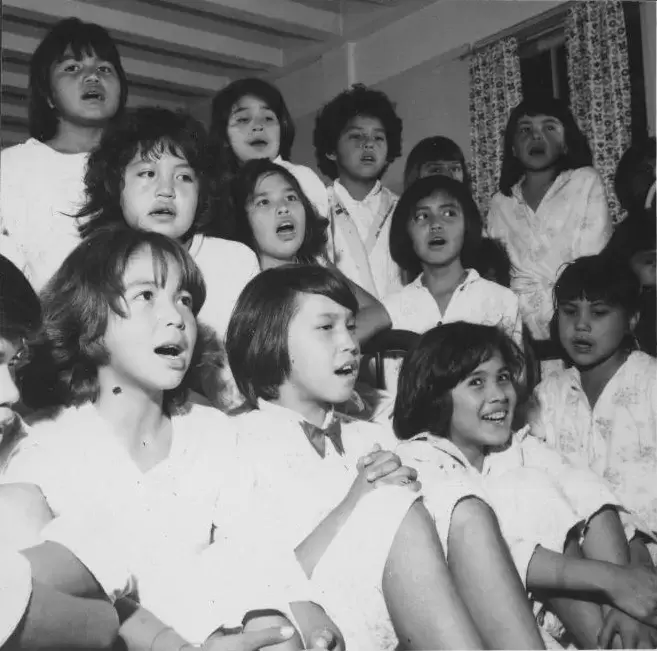Over its 78 years of operation in Tseshaht territory, a number of students at the Alberni Indian Residential School never made it back home. These countless tragedies have left an unsettled presence that many currently feel on the institution’s former site.
“There were so many children that never went home, they never had funerals - they just went missing,” said Tseshaht member Gail K. Gus. “And so, they’re around our reserve all over the place.”
Forty six years after the residential school closed, these “lost souls” are still felt by many in the First Nation, said Tseshaht’s communications coordinator Melissa Bigmore. The children have a presence around the former boys’ dormitory that still stands and Maht Mahs gymnasium, or even in the garden on the former AIRS grounds.
“Even our janitor who goes to the gym almost every day of the week, he can’t do his job without having headphones in because he hears children running, he hears doors slamming, they are knocking in the wall. They’re there,” said Bigmore.
From its early years as the Alberni Girls Home in the late 1800s, multiple deaths were recorded at the residential school, particularly from tuberculosis. In 1909 the issue prompted W.A. Henry to provide a long list of children who died at the school or soon after they were sent home to the Presbyterian Church.
In 2015 the Truth and Reconciliation Commission estimated approximately 6,000 children died in residential schools. A total of 150,000 Indigenous children attended the assimilationist institutions over their century and a half of operating in Canada.
Now the Tseshaht want these lost souls to be brought home, regardless of how far away the children’s families and tribes are to the former AIRS site. An invitation has been sent to 203 First Nations in B.C. “to honour those children who lost their lives while at the Alberni Indian Residential School,” reads a press release issued by Tseshaht First Nation on Aug. 2.
The two-day event takes place Sept. 27 – 28, beginning with a commemoration ceremony for the young lives lost at AIRS followed by a cleansing ceremony of the grounds. In addition, people will be invited to take part in other cleansing ceremonies, including traditional brushing. It is hoped that by doing these ceremonies healing can begin and people can have closure.
“People that died with trauma or died unexpectedly, it’s important that we release that,” said Tseshaht member Ed Ross. “We want to give the opportunity for other nations to come and clear that energy and to take back whoever is there.”
“Those lost souls might not know Nuu-chah-nulth,” added Gus. “Their people may need to come for them.”
Indian Residential Schools were scattered across Canada, starting in the 1880s through to 1996 when the last one finally closed. In Nuu-chah-nulth territory, Christie Residence, located in Tofino, was the last to close in 1983.
AIRS was operated by the Presbyterian United Church and was filled with Indigenous children from all over the province. While it has been closed for 46 years, survivors and their descendants remain deeply affected by trauma experienced at the institution.
According to Open Education, BC Campus, the Indian residential school system was created by the Canadian government to educate and assimilate Aboriginal children into Christian, Euro-Canadian cultural norms and knowledge bases. Assimilation is the process of social integration that requires adopting the ways of a different and often controlling culture or society.
The majority of the schools were federally funded and run by various Christian churches. From 1920 to 1948, attendance was compulsory for Aboriginal children between the ages of four and 16.
Ross stressed how energy stays within a person after a traumatic experience, an important phenomenon for the many surviving students of the Alberni Indian Residential School.
“It’s the pain that keeps people there. These people that left there, they’re still stuck in cycles because of what happened to them there,” he said. “We have no control what happened, why they came here, why they picked us. It was put on us. But we want our people to know that Tseshaht is open for anybody to come here and do work and to heal. We want them to feel free and especially safe.”
As a child Gus recalls seeing residential school students on the other side of a chain link fence that lined the AIRS site. Her mother attended the institution for seven years.
“It’s a horrible stain,” she said of the school’s legacy, which prompted building the Tseshaht community garden on the former site. “The reason why I wanted to have the garden where I have it is because I believed that the earth even needed to heal.”
Attendees will be given the opportunity to speak at the gathering. It is anticipated that this will be an emotional experience for participants and resource people will be there to provide support. Participants are invited to bring anything to help them speak their truth and begin the healing process.
The healing event will take place at Maht Mahs Gym, which is a remnant of AIRS. The event will conclude with a feast, singing, drumming and dancing – all in recognition of children lost over the residential school’s tenure.
“Those things that happened, we’re going to honour them,” said Ross. “We’re going to honour them and show them that they never died for nothing. We’re here because of you still.”
“We don’t want them to be stuck here because they can’t find their way home,” Bigmore added. “We’re looking to help facilitate their way home because we care about them. We want them to be at peace.”
Interested participants can register for the healing event at Tseshaht.com. Travel assistance is available on a first-come-first-served basis. For more information contact Melissa Bigmore, Tseshaht First Nations communications coordinator, at 250-724-1225.







